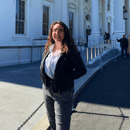“I’m not cooking tonight,” is Chef José Andrés first remark to the nearly packed auditorium as he received a standing ovation at an event hosted by George Washington University and Politics and Prose this past Friday.
The internationally known chef visited the D.C. community to discuss his newly published book, We Fed an Island, which he wrote with journalist Richard Wolffe. Both in his book and during the event, Andrés shares his heroic actions in Puerto Rico just days after Hurricane Maria caused mass destruction and devastation.
Using his cooking skills, Andrés assembled a team to begin preparing and distributing free meals to all those who were left without shelter, supplies, water and food after the Category 4 storm struck the small island.
It “took a village to do what we did,” Andrés says when speaking about the volunteers. World Central Kitchen and his other organizations assisted in this project to feed Puerto Rico. Arriving at the island with only 20 volunteers producing 1,000 meals a day, he ended up with over 25,000 volunteers producing over 50,000 meals a day.
Many cannot begin to grasp how Andrés was able to pull this off during the chaos that had developed due to the lack of resources and communication outlets on the island. Andrés simply replies that he “embrace[d] complexity with really, very simple solutions.” Some of these solutions included establishing a line of credit with the local grocery stores to use whatever they had to offer, setting up lines of intelligence with each small community he visited and, most importantly, giving hope.
The line of credit with the grocery stores helped move along an economy that had been worsened by the storm. They allowed Andrés to not only supply food and clean water, but also deliver medicine to those who were still in flooded and unreachable areas. The chef would continue to visit and provide aid to towns and villages until they were under control. Hope was given simply by “not dropping and leaving,” says Andrés.
Despite anger being expressed towards the U.S. federal government and Trump specifically, Andrés makes it clear that his book is “not a criticism” towards them. In fact, the chef thanked the federal government because much of what happened and was done in Puerto Rico is thanks to the federal government. Andrés specifically notes how much the U.S. Navy assisted in shipping in supplies.
However, some light was shed on all the government neglected to do when Puerto Rico was in desperate need of basics—specifically they provided little to no clean water. Andrés shared a story about 20,000 water bottles that were left sitting in an airport, ready to be delivered to Puerto Rico but never were. This is due to the federal government’s lack of sense of emergency that forced Andrés to follow absurd, drawn out protocols when, in the end, the water was never distributed. This especially bothered Andrés because, despite the U.S. having the strongest military and federal government, they were unable to do “something so simple.”
As for Trump, Andrés says he has never blamed him for the deaths in Puerto Rico and does not believe you can put all of that on one man. However, Andrés adds that “If you do not have empathy, you cannot be the leader of the people.” Andrés also refers to the time when Trump gave himself a 10 out of 10 in the help he provided for Puerto Rico. While Andrés disagrees with Trump’s score of himself, he does say he would only give himself a 5 out of 10.
The chef claimed he had a “master plan” to not only feed all of the Puerto Ricans in need, but to also get their schools back up-and-running, stabilize their economy and begin building new roads and houses. Unfortunately, Andrés feels he failed in this sense because millions of Puerto Ricans still died of starvation and he never got to see his master plan unfold. Many of those in attendance that night who stepped up to speak to Andrés reassured him that he is nothing short of a hero.
In addition to Puerto Rico, Chef José Andrés has also given aid to Haiti after the earthquake and to Texas after Hurricane Harvey. His humanitarian work is continuing in the Carolinas for he began his drive there immediately after the talk. Andrés will not stop until all those affected by natural disasters are given a hot meal and provided with the support they deserve because he believes “the emergency when we talk about food and water should be now.”



